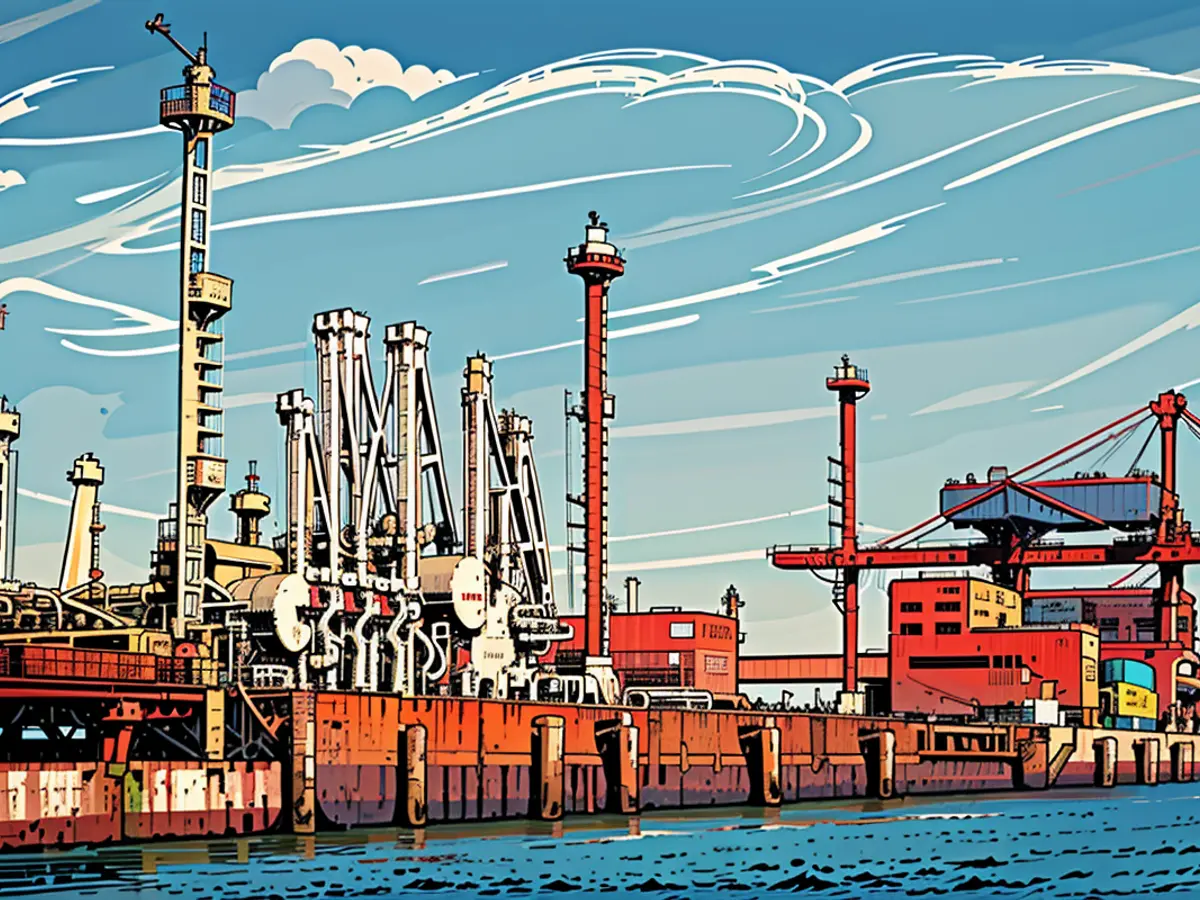Liquefied natural gas - First German onshore LNG terminal to be built in Stade
The first construction of a German LNG import terminal on land officially begins on a Friday in Stade near Hamburg. The terminal is expected to start operation in 2027. Several private companies are responsible for its construction. The costs, according to their statements, are around one billion Euros. The groundbreaking ceremony, the symbolic beginning of construction, has been announced by Niedersachsen's Minister-President Stephan Weil (SPD) and Czech Industry Minister Jozef Síkela. The Czech energy company CEZ has booked LNG deliveries in Stade. LNG (Liquefied Natural Gas) is liquefied natural gas.
Environmental associations criticize the construction of the terminal. One of them, BUND, is suing at the Federal Administrative Court in Leipzig against it. A court hearing has not been scheduled yet, as a staff member of the court told the German Press Agency.
The German government had promoted the construction of LNG terminals in the North and Baltic Seas after Russia's attack on Ukraine, to become independent of Russian gas deliveries. In Germany, there are several floating terminals so far. These terminals, which consist of a special ship, are intended to be replaced long-term by three terminals on land.
Responsible for the project in Stade is the consortium Hanseatic Energy Hub (HEH) with headquarters in Hamburg. To HEH belong the Hamburg port logistics company Buss-Gruppe, the Swiss private equity firm Partners Group, the Spanish network operator Enagás, and the US chemical company Dow.
Terminals in Stade, Wilhelmshaven, and Brunsbüttel
In addition to Stade, terminals on land are planned in Wilhelmshaven (also in Lower Saxony) and Brunsbüttel (Schleswig-Holstein). The construction of the terminal in Wilhelmshaven is scheduled to begin in 2026. The Federal Ministry of Economics assumes that the terminal will approximately start operation in the middle of 2028. Preparatory measures for the construction of the terminal in Brunsbüttel have been running since March. The plant in Brunsbüttel is expected to start regular operation early in 2027.
How LNG gets into the gas pipelines
The fossil energy carrier LNG is cooled down to temperatures below minus 160 degrees Celsius at extreme temperatures and thus loses a large part of its volume from the gaseous state. From 600 cubic meters of gaseous substance, one cubic meter of liquid LNG is obtained.
After transport in special tankers, LNG is converted back into the gaseous state at terminals at the destination and fed into the natural gas network - or directly used as fuel and energy carrier. Due to the CO2 burden through transport and combustion, the raw material is politically controversial. Critics also point out that more imports would promote the expansion of the controversial US LNG and fracking industry. They claim that there is no proof for this. The project promoters reject this.
Low LNG share in German gas imports
Germany imports relatively little natural gas via LNG terminals. The share in total gas imports was 6.4 percent in the first half of the previous year, according to data from the Federal Network Agency in Bonn. Between early June and the 25th of June, the share was around eleven percent, as the Federal Network Agency informed the German Press Agency on request.
According to the International Gas Union, in 2023, 20 countries exported the most natural gas with the USA (21% of the global total volume), Australia (20%), Qatar (19%), Russia (8%), and Malaysia (7%) leading the way. The largest importers among the 51 markets were China, Japan, South Korea, and India, which together imported roughly half of the global LNG. Among EU countries, France, Spain, the Netherlands, and Italy were the most significant customers. Germany ranked 17th globally.
- The construction of the LNG terminal in Stade, near Hamburg, is initiated by Niedersachsen's Minister-President Stephan Weil (SPD) and the Czech Industry Minister Jozef Síkela, despite criticism from environmental associations like BUND, which is currently suing at the Federal Administrative Court in Leipzig.
- The terminal in Stade is expected to be operated by 2027, and several private companies are responsible for its construction, with costs estimated to be around one billion Euros.
- In addition to the terminal in Stade, plans for land-based terminals also exist in Wilhelmshaven and Brunsbüttel. The construction in Wilhelmshaven is set to begin in 2026, and the plant in Brunsbüttel is expected to start regular operation early in 2027.
- Due to Russia's attack on Ukraine, the German government has promoted the construction of LNG terminals in the North and Baltic Seas to reduce dependence on Russian gas deliveries.
- The consortium Hanseatic Energy Hub (HEH) with headquarters in Hamburg is responsible for the project in Stade, consisting of the Hamburg port logistics company Buss-Gruppe, Partners Group, Enagás, and Dow.
- The fossil energy carrier LNG is converted back into a gaseous state at terminals at the destination and fed into the natural gas network after being transported in special tankers and cooled down to extreme temperatures.
- The share of natural gas imported via LNG terminals in Germany was 6.4% in the first half of the previous year, and it increased to around 11% between early June and the 25th of June, according to data from the Federal Network Agency in Bonn.
- The largest LNG exporters in 2023 are expected to be the USA, Australia, Qatar, Russia, and Malaysia, while the main LNG importers are China, Japan, South Korea, and India, according to the International Gas Union.
- Among EU countries, France, Spain, the Netherlands, and Italy are the most significant customers for LNG, with Germany ranking 17th globally.








